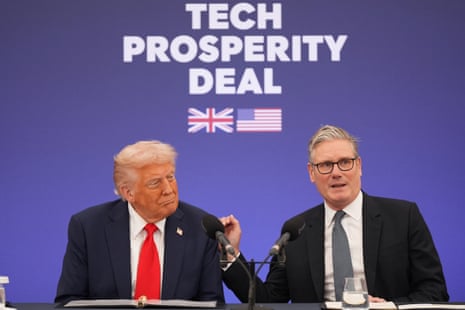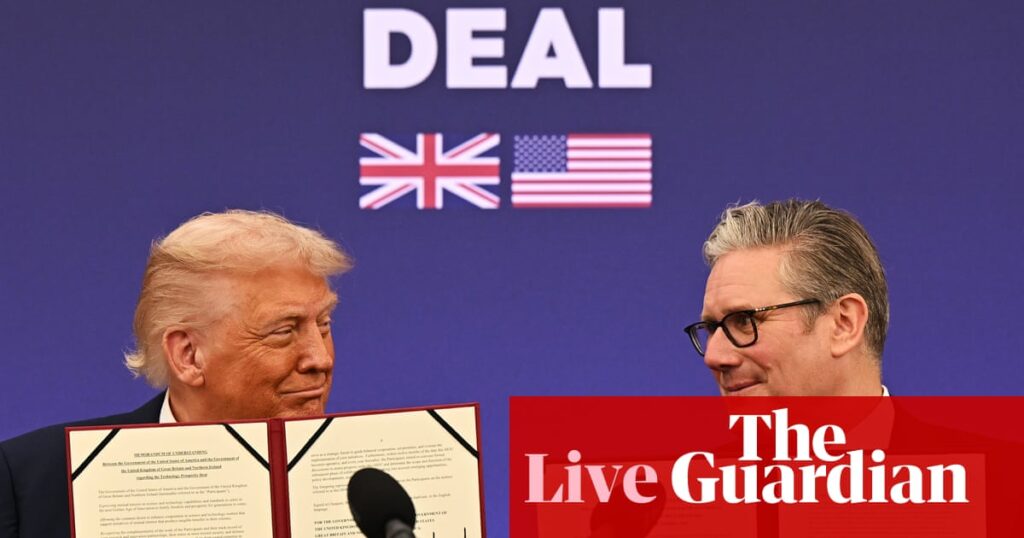Starmer says US-UK investments announced as part of state visit have broken all records
At Chequers Keir Starmer and Donald Trump are speaking at a reception for business leaders.
Starmer says the US-UK investments announced this week have broken all records. He says:
Just look at what we’re achieving today together. The deals and investment that you’re announcing today break all records.
What a day £250bn flowing both ways across the Atlantic.
It is the biggest investment package of its kind in British history by a country mile.
Here is the No 10 news release about the investments. (The No 10 release talks about £150bn investment into the UK. Starmer seems to have produced a bigger figure by including UK investment into the US.) And here is the overnight Guardian story about this.

Key events
Starmer and Trump sign ‘tech prosperity deal’
At one point Trump seemed to be referencing a script, but now he is just rambling about what he says are his achievements.
He says the US is ahead of China on AI.
The US will be the UK’s best partner, he says.
He says the king of Saudi Arabia recently said that, under Trump, the US had become “the hottest country anywhere in the world”.
He says the US economy is thriving.
The border has been “totally closed”, he says.
And he claims inflation is “virtually non-existent”.
(Like much of what Trump says, that last claim is not true.)
Trump says he has slashed regulations, even more than in the past. There will still be some regulation, but it will be ‘“sane regulation” he says.
And he claims no one has ever seen anything equivalent to his recent, tax-cutting so-called “Big, Beautiful Bill”.
(That is true, sort of. The bill has been described as “the most unpopular major legislation in decades”.)
After Trump finishes speaking, he and Starmer pose for a picture with signed copies of the “tech prosperity deal”.
Trump again pays tribute to the business leaders in the audience.
He says he wanted his first trade deal to be with the UK because “the bond is so strong and the relationship so long”.
It will create opportunities for farmers in the US worth billions, he says.
He says the UK has a world-class aerospace supply sector. A lot of people don’t undersand how important it is, he says.
Both countries are building up industrial capacity, he says.
And the tech agreement is historic, he says.
Trump says bond between US and UK ‘unbreakable’
Donald Trump is speaking now.
He says “this is what I do for a living” – referring to his pre-presidential career as a businessman. Addressing business leaders is what he is used to, he suggests. And he tells the audience: “You’re the best in the world.”
He says he and Melania will be forever thankful to the king for the “fantastic” evening last night.
The ties between the UK and the US are “priceless”, he says.
It’s an unbreakable bond we have. Regardless of what we’re doing today, I think it’s unbreakable.
Starmer says US-UK investments announced as part of state visit have broken all records
At Chequers Keir Starmer and Donald Trump are speaking at a reception for business leaders.
Starmer says the US-UK investments announced this week have broken all records. He says:
Just look at what we’re achieving today together. The deals and investment that you’re announcing today break all records.
What a day £250bn flowing both ways across the Atlantic.
It is the biggest investment package of its kind in British history by a country mile.
Here is the No 10 news release about the investments. (The No 10 release talks about £150bn investment into the UK. Starmer seems to have produced a bigger figure by including UK investment into the US.) And here is the overnight Guardian story about this.
Universities in England to face Ofsted-style judgments, Office for Students says

Richard Adams
Richard Adams is the Guardian’s education editor.
Universities in England will face Ofsted-style summary judgments, with those failing to pass minimum quality standards likely to be punished, according to proposals published this morning by the Office for Students (OfS).
The OfS’s revised Teaching excellence framework (Tef) will see all universities given gold, silver, bronze or “requires improvement” ratings every three to five years, based on measures of student outcomes such as completion rates and graduate employment – with each university paying £25,000 for the assessment.
Those given bronze or “requires improvement” grades face a range of potential punishments including restrictions on their ability to award degrees or recruit students.
The OfS’s decision to link overall judgments to sanctions comes as Ofsted is moving in the opposite direction for schools in England, having just replaced overall grades such as outstanding or requires improvement with a new “report card” summary of its inspections.
It comes as a new survey by YouGov found that two-thirds of students in England and Wales said the standard of university education and graduate wage levels “are not enough to warrant the cost of English [or] Welsh university degrees”.
However, 80% of the 900 students surveyed said they were satisfied with the quality of their degree course, and 78% said their degree would lead to a good job.
Council spending in England on emergency housing for homeless families up 25% in past year, figures show

Patrick Butler
Patrick Butler is the Guardian’s social policy editor.
In one of the starkest indicators of the housing crisis, new official figures have revealed English councils spent £2.8bn providing housing emergency housing for homeless families last year, an annual increase of 25%.
The bill for so-called temporary accommodation – short-term lets and bed and breakfast hostels – has doubled in the last five years, and is and a growing threat to the financial viability of some councils.
Private landlords have been accused on “cashing in” on the crisis – a third of the 2024-25 bill (£844m) went on putting up families in bed and breakfast rooms, with a further £1bn spent on nightly paid short-term lets.
A Guardian investigation earlier this year found private landlords and hotel owners were charging councils up to 60% more than normal market rents for properties that were often dirty, overcrowded and unsuitable for families.
Spiralling rent, insecure tenures, shortages of social housing, and housing benefit freezes have driven an explosion in family homelessness in recent years, with some councils now spending over half their budget on temporary accommodation.
As of 31 March there were 131,000 households in temporary accommodation. These included 169,000 children – a figure some estimates predict will rise to nearly 200,000 by the end of the decade.
“Private providers are cashing in on this crisis, charging eyewatering sums for rooms where children are forced to eat, sleep and do their homework on beds shared with siblings,” said Mairi MacRae, director of campaigns at housing charity Shelter.
In the Royal Library at Windsor Castle, Queen Camilla and Melania Trump inspected a display case with drawings by Leonardo da Vinci, Raphael, and Holdein.
Among the other items they looked at were a prayer book belonging to Queen Elizabeth I and Charles I’s copy of Shakespeare’s second folio, which he read before his execution in 1649.
Robert Peston from ITV News has posted some footage on social media showing where the journalists are being held at Chequers as they wait for the Trump/Starmer press conference.
Ahead of the state visit, the Newsmax CEO Christopher Ruddy (see 10.11am) hosted a party attended by senior rightwing British politicians. In an article for the Daily Telegraph, Gordon Rayner says the event degenerated into a row between the senior Tories over record of the last government.
After [Nigel] Farage, [Marco] Rubio and [Scott] Bessent had left to attend another event, the Tory big beasts and a smattering of Reform bigwigs sat down to an evening of dinner and civil war.
[Boris] Johnson, [Liz] Truss, former transport secretary, Mark Harper, and broadcaster, Andrew Neil, argued about the Tories’ record in government, particularly on immigration, and what the future direction of travel should be.
Jacob Rees-Mogg, who could be regarded as the current standard-bearer of uniting the Right, (he even attended the Reform conference this month), tried and failed to argue that they should all work together for the good of the country. Reform members smiled wryly as they watched the Tories tear lumps out of each other.
There is a lot of talk in the UK at the moment from people how think the right can only win the next election if the Conservatives and Reform UK can somehow work together. The former Tory minister Steve Baker said only this week he thought some sort of deal was unacceptable.
But Rayner suggests that will be difficult. Referring to Boris Johnson, he quotes a “senior Reform figure” as saying:
[Johnson] elicits a visceral emotion in our members. One of the most consensual opinions among Reform members is that he was a disaster, and has already claimed the title of the man who ended the Conservative party’s chances of ever regaining power.
If we let him join Reform, there would be an exodus of 99.9% of our members.
UK pharma sector awaits further details from Trump on tariff concessions from US

Lisa O’Carroll
Lisa O’Carroll is a senior Guardian correspondent covering trade.
Deals on steel and tech are sealed, but two other sectors caught in the cross hairs of Donald Trump’s UK tariff deal are anxiously waiting for promises to be delivered by the US president today.
The US pledged a “significantly preferential” treatment of the UK’s pharma sector in June, which had yet to materialise.
While the presence of a GSK boss at last night’s banquet may indicate movement on a deal, the question is not just whether the UK gets a further discount on a 10% blanket tariff, but what is included.
The detail on the EU side has yet to materialise with Irish deputy prime minister Simon Harris telling the Guardian “a big body of work” has yet to be done to establish what exactly the 15% tariff would apply to.
Trump locked in a 15%top tariff rate for pharmaceuticals exported from the EU as part of the joint statement released at the end of August, with a zero or close to zero rate on “generic pharmaceuticals and their ingredients and chemical precursors”.
“We don’t have that list of what the generics is or for medical devices,” Harris said.
Trump’s decision to impose 15% tariffs on imports of pharma from EU is already breaching a World Trade Organization agreement that tariffs are not imposed on most medicines for public health reasons.
There is also an expectation both in the EU and in London that exports of wine and spirits will return to pre-Trump, rates when spirits were rated zero on import to the US and wine was rated between 0.5% and 1.8%.

